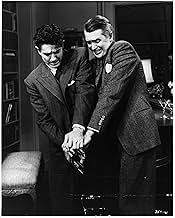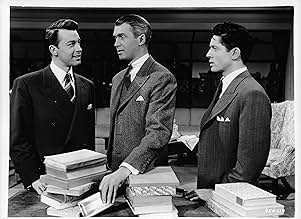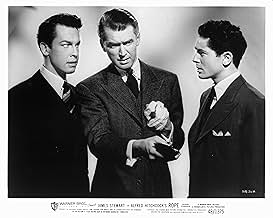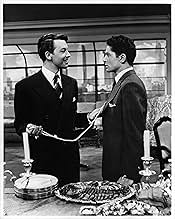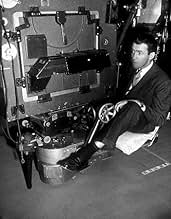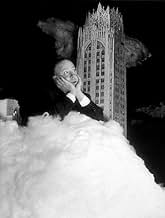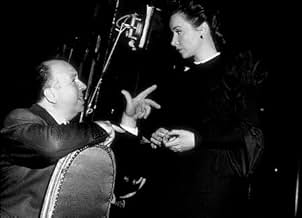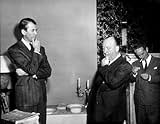Deux hommes tentent de prouver qu'ils ont commis le crime parfait en organisant un dîner après avoir étranglé à mort leur ancien camarade de classe.Deux hommes tentent de prouver qu'ils ont commis le crime parfait en organisant un dîner après avoir étranglé à mort leur ancien camarade de classe.Deux hommes tentent de prouver qu'ils ont commis le crime parfait en organisant un dîner après avoir étranglé à mort leur ancien camarade de classe.
- Réalisation
- Scénario
- Casting principal
- Récompenses
- 4 victoires et 3 nominations au total
Cedric Hardwicke
- Mr. Kentley
- (as Sir Cedric Hardwicke)
Peggy Robertson
- Woman Walking on Sidewalk
- (non crédité)
Avis à la une
'Rope', as many reviews here point out, is shot in a "real time" format. The movie lasts 80 minutes and takes place over a period of 80 minutes - with 10 8 minute takes spliced together smartly (such as switching when focused on a back) to give the appearance of one long take. Even current "real time" dramas such as "Nick of Time" or "24" use cuts - and perhaps justifiably.
"Rope" is about two college students - the slimy Brendon Shaw (John Dall) and his friend and sub-texted-gay-partner Phillip Morgan (Farley Granger) who murder an old college mate and then, minutes after, host a dinner party to prove their calm, intellectual superiority and their "right" to kill off the lower echelons of society - they believe they are exempt from common morality. Central to this is their smug desire to show off their theory to their old mentor, Rupert Cadell (James Stewart), who is attending the party, and to get him to agree with their theories.
As the movie is essentially confined to one room, and one take, there's a definite "play" feel to the movie. While this worked wonderful with "12 Angry Men", the script and character interaction isn't quite smart enough here to sustain it. There's a lot of pontificating by Shaw, and some fine retorts by Cadell but there's a sense of forcedness about it at the same time. Only 3 of the characters are drawn with enough conviction, and it is only Cadell who we can really admire (Granger's Morgan seems to be too much of a nervous twitching type to add much to the movie). The script does allow us to gape with incredulity at the Nietzsche-esque theories of the "superman" espoused by Shaw, and the gay subtext is amusingly, and cleverly, done but there's an inevitability about the whole story - we know what will happen, it does, and this creates an ultimate lack of tension (when compared to, for example, Hitchock's "Vertigo").
The direction is, as would be expected, smart and - naturally - innovative here. The camera drifts about from character to character, as Hitchock tries his "one cut" approach, and there's some nice background detail (such as Hitchcock's flashing neon signs) to show the passage of time/current theme. Overall "Rope" is well worth seeing - it's not quite a failed experiment, nor a successful one. It's a "curio" which is worth appreciating for realizing why it was never really emulated since.
"Rope" is about two college students - the slimy Brendon Shaw (John Dall) and his friend and sub-texted-gay-partner Phillip Morgan (Farley Granger) who murder an old college mate and then, minutes after, host a dinner party to prove their calm, intellectual superiority and their "right" to kill off the lower echelons of society - they believe they are exempt from common morality. Central to this is their smug desire to show off their theory to their old mentor, Rupert Cadell (James Stewart), who is attending the party, and to get him to agree with their theories.
As the movie is essentially confined to one room, and one take, there's a definite "play" feel to the movie. While this worked wonderful with "12 Angry Men", the script and character interaction isn't quite smart enough here to sustain it. There's a lot of pontificating by Shaw, and some fine retorts by Cadell but there's a sense of forcedness about it at the same time. Only 3 of the characters are drawn with enough conviction, and it is only Cadell who we can really admire (Granger's Morgan seems to be too much of a nervous twitching type to add much to the movie). The script does allow us to gape with incredulity at the Nietzsche-esque theories of the "superman" espoused by Shaw, and the gay subtext is amusingly, and cleverly, done but there's an inevitability about the whole story - we know what will happen, it does, and this creates an ultimate lack of tension (when compared to, for example, Hitchock's "Vertigo").
The direction is, as would be expected, smart and - naturally - innovative here. The camera drifts about from character to character, as Hitchock tries his "one cut" approach, and there's some nice background detail (such as Hitchcock's flashing neon signs) to show the passage of time/current theme. Overall "Rope" is well worth seeing - it's not quite a failed experiment, nor a successful one. It's a "curio" which is worth appreciating for realizing why it was never really emulated since.
Rope is one of the finer films that Hitchcock made. Philosophy, sociology and psychology are contained in equal parts. The plot is simple, the characters are complex and Hitchcock's treatment of the Leopold and Loeb parallel quite deft. The final soliloquy from Jimmy Stewart's character, Rupert, is not only one of the finest examples of Stewart's acting abilities but also of film-making.
On the subject of filmmaking - Hitchcock filmed this in as much of a single take as possible. I believe there are only five edits in the whole thing. I can wholeheartedly tell you that it was no gimmick on Hitchcock's part. The play's plot requires that a certain amount of tension be maintained. Tracking shots are used for this purpose and quite well in my opinion. Timing, position and prop movements alone are to force us to stand in awe of a logistical challenge. All the actors are played superbly. The dialogue is natural and flowing. The finest bit of timing involves a swinging kitchen door, the rope, and the fear of discovery.
In short, this is a fine film that cannot disappoint. Highly recommended and will be well worth your time.
On the subject of filmmaking - Hitchcock filmed this in as much of a single take as possible. I believe there are only five edits in the whole thing. I can wholeheartedly tell you that it was no gimmick on Hitchcock's part. The play's plot requires that a certain amount of tension be maintained. Tracking shots are used for this purpose and quite well in my opinion. Timing, position and prop movements alone are to force us to stand in awe of a logistical challenge. All the actors are played superbly. The dialogue is natural and flowing. The finest bit of timing involves a swinging kitchen door, the rope, and the fear of discovery.
In short, this is a fine film that cannot disappoint. Highly recommended and will be well worth your time.
What an unusual Hitchcock film... such a small cast, and the whole film consists of long takes. Before seeing this, I had heard enormously positive things about it... most of them coming from my father, who hadn't seen it for about fifteen years. I had high expectations for the film, but I must say it exceeded them. Though there are only a few cuts in this film, meaning the camera is running almost non-stop, Hitchcock makes great use of it; he manages to fit in many of his trademark angles and closeups in, without it seeming forced. At one point, the camera focuses for a minute and a half on an inanimate object with only one visible character moving back and forth near it, and he manages to drench the cut in suspense, leaving even the most calm and collected of viewers at the edge of their seat, biting their nails. Only the fewest directors could make that sequence work, and luckily Hitchcock is one of them. The plot is great. It's interesting and it develops nicely. The pacing is perfect. I was never bored for a second. The acting, oh the acting... John Dall is excellent as Brandon, the intellectually superior and very smug main character. Makes me wonder why he didn't get more roles in his career. Stewart is great, as usual. The rest of the acting is very good as well. The characters are well-written and credible. For such an unusual film, and despite the heavy feeling of watching a stage play rather than a film, it's very entertaining and effective. If for nothing else, watch this to enjoy Dall as the cold, calculating and manipulative psychopath. I recommend this to fans of Hitchcock and Stewart. 8/10
I have seen several negative comments about the eight 10-minute takes and three fade cuts that comprise this film, and many of them seem to miss the point. For example, bob the moo said, "but I don't understand why he didn't just accept that he would have to make do with 10 [actually, eight] different shots instead of trying to hide the edit. Each time he does it by zooming in on a black jacket and then pulling out again after the edit."
The whole idea was to build the suspense and make the action appear to take place in "real time" by not having the camera appear to blink. Thus the 10-minute takes (and three fade cuts at approximately 20-minute intervals); and I think it works very well. It also makes one appreciate the excellence of the acting. It is extremely difficult for actors to execute a film flawlessly in only eight 10-minute takes, and the three principal actors did a fantastic job under very stressful circumstances.
I think the reason the film was not a big box-office success is that people were expecting the usual Hitchcock action (think of earlier Hitchcock films such as Saboteur, Foreign Correspondent, The 39 Steps or The Man Who Knew Too Much). But any serious film buff should not miss this film.
The whole idea was to build the suspense and make the action appear to take place in "real time" by not having the camera appear to blink. Thus the 10-minute takes (and three fade cuts at approximately 20-minute intervals); and I think it works very well. It also makes one appreciate the excellence of the acting. It is extremely difficult for actors to execute a film flawlessly in only eight 10-minute takes, and the three principal actors did a fantastic job under very stressful circumstances.
I think the reason the film was not a big box-office success is that people were expecting the usual Hitchcock action (think of earlier Hitchcock films such as Saboteur, Foreign Correspondent, The 39 Steps or The Man Who Knew Too Much). But any serious film buff should not miss this film.
You know the quote about Actors being cattle. Hitchcock corrected saying he never said that actors were cattle what he said was that actors "should be treated" like cattle. Great actors give perfect performances in Hitchcok films. Think of Grant and Bergman in Notorious, Cotten in Shadow Of A Doubt not to mention Anthony Perkins in Psycho. Often the improbabilities of the plot become totally credible by the credibility of the performances. Here, John Dall and Farley Granger act and act to outrageously that it's impossible to believe they can get away with it for more than five minutes. Their characters are impossible to warm up to like it happened with Anthony Perkins in Psycho or with Colin Firth in Apartment Zero, no matter how sickly those characters are you can't help connect with their humanity. Hitchcock in Rope seemed much more taken by the technical wizardry and it is unquestionably fun to watch. So Rope provided me with superficial pleasures and sometimes that's enough.
Le saviez-vous
- AnecdotesSince the filming times were so long, everybody on the set tried their best to avoid any mistakes. At one point in the movie, during the first take scene, the camera dolly accidentally ran over and broke a cameraman's foot, but to keep filming, he was gagged and dragged off the soundstage. Another time, a woman puts her glass down but misses the table. A stagehand had to rush up and catch it before the glass hit the ground. Both parts are used in the final cut.
- GaffesWhen Phillip and Brandon put David in the chest, the rope is clearly around David's neck and completely inside the box. But in a few minutes Phillip finds the rope hanging, very far, outside the box.
- Citations
Mrs. Atwater: Do you know, when I was a girl I used to read quite a bit.
Brandon: We all do strange things in our childhood.
- Crédits fousThe closing credits list the victim David Kentley first, and the rest of the cast as credited with a phrase describing their relation to him ("His friends - Brandon, Phillip", "David's girl - Janet", etc) and use only a first/last name.
Rupert Cadell is listed last, and with his full name and without any phrase of relation.
- ConnexionsFeatured in Great Performances: James Stewart: A Wonderful Life (1987)
Meilleurs choix
Connectez-vous pour évaluer et suivre la liste de favoris afin de recevoir des recommandations personnalisées
- How long is Rope?Alimenté par Alexa
- What is 'Rope' about?
- Is "Rope" based on a book?
- Was Rope really filmed in a single take with no cuts?
Détails
Box-office
- Budget
- 1 500 000 $US (estimé)
- Montant brut mondial
- 11 580 $US
- Durée1 heure 20 minutes
- Couleur
- Rapport de forme
- 1.37 : 1
Contribuer à cette page
Suggérer une modification ou ajouter du contenu manquant




